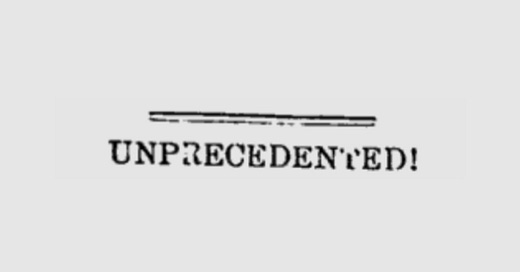Welcome to Money Buff! Feel free to check out my other posts, and follow me on Twitter for more regular thoughts! For more about the hows and whys of investing, subscribe here:
Unprecedented is our new favorite word. It was 2020’s Word of the Year and continues to dominate our vocabulary.
Andrew Jackson was the first president to use the word, in 1831. Thereafter, presidents often reserved it for major addresses. FDR discussed meeting “the unprecedented task before us” during his inaugural address. Barack Obama’s first remarks were, “We begin this year and this administration in the midst of an unprecedented crisis that calls for unprecedented action.”
Presidents have used “unprecedented” to describe everything from the death of Elvis (Jimmy Carter) to the Soviet invasion of Afghanistan (Ronald Reagan).
According to Google nGram, a tool that shows word frequency in media over the years, there’s been a whole bunch of unprecedented times. Theoretically, fewer things should be unprecedented as time passes. Yet we’ve seen its usage skyrocket in the last twenty years:
Will this trend cool off as it did after the 1920s? Who knows. Nonetheless, many young people are tired of living through major historical events. The question becomes: Are more things unprecedented, or are we not keen to history?
While the events of the early 2000s have been dramatic, they are a sobering reminder that humans have lived through similar times. The early 1900s brought a pandemic, World War, market collapses, and depression.
The early 1800s brought massive expansion, the Monroe Doctrine, the Indian Removal Act, and many conflicts including the War of 1812.
That’s just recent history.
Every generation feels like they got the short end of the stick. Billy Joel’s 1989 song “We Didn’t Start the Fire” exemplifies this. He highlights the cultural unrest of the late 20th century in a rhythm that seems to mimic the speed at which the tumultuous events happened. Society was changing at an incredible speed, fueled by events like the JFK assassination, Watergate, the Vietnam War, the Red Scare, and more.
Redditor u/sighbourbon provides a historical account:
I was in 2nd grade when President Kennedy was shot in the head, live on national television. His brain flew out into his wife's lap. It set off a wave of assassinations (president's brother, MLK, etc). I grew up knowing that the yellow and black triangles symbol meant "fallout shelter" and we were supposed to go there in case of nuclear attack. We did "duck and cover" drills in elementary school. Hide under your desks. Once, they sent us home with pamphlets about nuclear attack preparation. They flew warplanes overhead once per week after bedtime, faster than the speed of sound, and we would hear the "sonic boom" which scared the crap out of me. It rattled the windows, shook the house. Wasn't too much later the government had a giant meltdown that scared the crap out of everyone. Watergate, it was called. Huge corruption scandal, everyone was just breathless with shock and disgust and fear. Around this time we were also in a totally illegal war, and we had a freaking lottery to decide which 18-year-olds would be forced to go fight the Viet Cong in the jungles of Southeast Asia. High school grads coming back in body bags, kids running away to Canada to avoid getting roped into the army.
Anecdotes like these give perspective. There are countless stories reminding us that precedents stretch further than one’s lifetime. Naturally, a disproportionate significance is given to our personal experience. Especially when our story is filled with many of the same emotions.
It’s impossible to conceptualize the uncertainty and fear experienced during past major crises. History is reduced to pages in a textbook, and precedents start to reset. Forgotten times feel new.
Outside the National Archives Building in Washington, DC is a phrase Shakespeare famously used in The Tempest, “What’s past is prologue”. It stands for the idea that history sets the stage for the present. Although, the prologue does not necessarily steer the story. It’s the actions taken throughout that make the story. While increased usage of “unprecedented times” coincides with challenging points in our history, the peaks also manifest new beginnings of growth and innovation.
Not only does history instruct, but it also shows us that the range of possible outcomes is not limited to what happened in the past. Whether it’s the longest recession or the fastest recovery.
Everything is unprecedented until it’s not.








